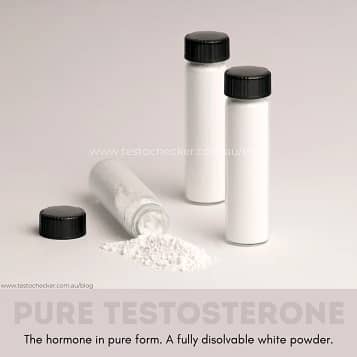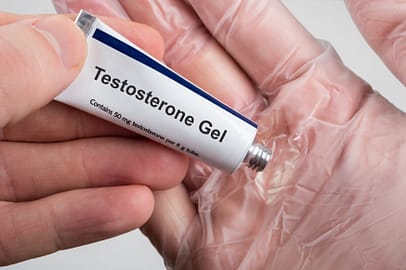Testosterone, it has been heralded as the elixir of youth; it is the hormone that declines with age and the hormone that we need more of to enhance our physical performance. But questions exist if any of these statements are really true and, importantly, if testosterone supplementation is actually worth it, read on.
The male steroidal hormone Testosterone ..
.. belongs to a family of hormones called androgens, and is produced by the testes, along with another potent androgen, dihydrotestosterone. Androgens are responsible for male characteristics, such as facial hair and a deep voice, and for sexual function. They are also needed to build muscle mass and bone mineral density.

We need it, both Men and Women.
We live in a world where life expectancy continues to increase (according to the World Health Organisation – 65 years old is still young!) and with that, expectations for staying fit and healthy keep growing. Many of us are motivated to keep ourselves in good condition, whether that’s trying to keep the extra pounds at bay or being a fully-fledged fitness nut and living for the next endorphin fix.
For these reasons, older men who are concerned about their testosterone levels or men looking to enhance their fitness performance are turning to testosterone supplementation.
Bioidentical hormone replacement
Bioidentical hormone replacement is a type of testosterone (T)-therapy applied in a gel, patch or pellet, or by injection. Another type of T-therapy are testosterone boosters, natural compounds that are alleged to enhance the body’s own testosterone production and which are heavily marketed AT men worldwide.
T-therapy has seen an extraordinary rise in popularity over recent years with uptake in the US now being in the millions. Compensating for low testosterone sounds great if T-therapy can deliver on its promises, but it turns out that not everyone actually needs testosterone supplementation and for those that do choose to navigate that path, proceeding with caution is recommended.
The age-old conundrum of testosterone decline
Testosterone levels peak during a man’s 20s, and tend to start slowly dropping off around the age of 35, with a continual decline thereafter. By the age of 50, testosterone levels may be half of what they were at the age of 20.
This decline in testosterone has been blamed for a whole host of medical ailments in aging men, including metabolic disease, diabetes, loss of sex drive, erectile dysfunction, sleeping problems, depression, decreased lean muscle mass (and reduced fitness performance) and osteoporosis.
Low testosterone gets an awfully bad rap. But there is a problem.
Association needs to be separated from cause, and it is not proven whether low testosterone causes poor health, or if poor health causes low testosterone. It is like a philosophical case of whether the chicken or the egg came first!

The use of Testosterone Gel in the USA has soared. Check out our Blog – ‘Big Pharma and Testosterone‘
The link between low testosterone and our health is, unfortunately, not straight forward. Studies in healthy older men with no medical complaints find that age does not have an effect on testosterone levels. This means that a deficiency in testosterone may well be the result of another health issue or the use of certain medications.
For example, obesity is linked with lowered testosterone levels. But with older age it gets much more difficult to shift those extra pounds around the belly – it’s hard to know which comes first. An increase in central belly fat disrupts insulin regulation and alters the amount of a protein that binds testosterone. This is directly responsible for reducing testosterone levels, and cruelly this decline in testosterone can make central obesity worse and increase risk of metabolic disease. Whether obesity or low testosterone comes first, this scenario turns into vicious circle that is hard to break.
How do I find out my t- levels?
If you suspect that your testosterone levels are higher or lower than they should be, the good news is that it is easy to find out! With this information at hand, your doctor can help you take the most appropriate course of action.
Saliva sampling: Saliva is ideal for measuring androgen hormone levels from home, providing a convenient and simple process to get a handle on your hormone profile. Importantly, measuring testosterone levels in saliva detects free, bioactive testosterone, giving a picture of how available your testosterone is for action. The testosterone test kit from TestoChecker measures this unbound fraction of the hormone.
What the studies say
Clinically diagnosed androgen deficiency – hypogonadism – occurs when the testes under-produce testosterone due to faulty signalling from the brain or within the testes themselves. In younger men, these cases are treatable using testosterone replacement therapy with good results and few side-effects.
However, in older men, the benefits of testosterone therapy are less clear. Some studies looking at testosterone therapy in men >50 years of age have shown that supplementation can improve bone mineral density, increase muscle strength and may have a small to moderate benefit for sexual function.
But the truth is that the results of many studies are inconsistent. More research is needed, especially in older men, before the benefits of testosterone supplementation can be certain.
A word of warning and some tips
Carey Danis &Lowe, a legal Practice in the United States make the claim, “Patients who used Testosterone Gels have suffered heart attacks, strokes, and in some cases, have succumbed to the drug’s effects.” However it must be remembered, they are a legal firm establishing a country wide class-action against the manufactures of AndroGel, AbbVie and Eli Lilly & Co. who make Axiron, a similar testosterone gel.
On top of uncertainty over the effectiveness of testosterone supplementation in some men, according to the FDA, over-supplementation with testosterone products may not be safe.
The fact is, testosterone is an anabolic steroid, having powerful effects in the body and should never be abused. Serious side-effects are an increased risk of prostate disease, heart attack and stroke. Other notable side-effects include insomnia, body acne, hair loss and water retention.
Some of the side-effects described above are caused by a rise in estrogen levels. Estradiol (E2) is synthesised from testosterone, so when testosterone levels are increased more is converted into estrogen. While it is normal for men to make some estradiol, which is important for bone health, abnormally high levels can lead to male breast tissue growth (gynecomastia) and female-pattern fat distribution.
And one more thing… if you weren’t expecting to sign up for contraception read on… Paradoxically, too much testosterone can block fertility by switching off hormone signals in the brain, leading to testicular shrinkage and inhibiting sperm production.
Be T smart – use testosterone supplementation safely

Injectables come with risk.
Despite this warning, many men still choose to take testosterone supplements with the hope that the potential benefits will outweigh the risks.
As long as T – levels remain within physiological levels (that is the normal testosterone range in healthy males), and medical contraindications are not ignored, testosterone supplementation will be safer.
It is highly recommended to regularly monitor salivary testosterone levels to check that:
- testosterone replacement therapy or booster supplements are actually working, and whether it is worth continuing
- unwanted increases in estradiol (E2) are not occurring
- testosterone levels do not become dangerously high (supra-physiological) substantially increasing the risk of adverse medical events
Other (less risky) ways to increase testosterone levels
If T-therapy is not for you don’t worry, there are other options
- The age-related decline in testosterone can be circumvented by good lifestyle choices. A study in 2008 showed that avoiding smoking, maintaining regular exercise, reducing alcohol intake, eating more fish, reducing salt intake, eating reduced fat diary, and keeping BMI <25 was associated with higher testosterone levels in men.
- Select foods with high levels of zinc and potassium – getting these minerals into your diet will have ample benefits for your health. They help to boost the immune system, reduce risk of diabetes and high blood pressure and can improve male fertility. Conveniently, these essential minerals are needed for testosterone production. Foods high in protein are a good source of zinc. avocado, spinach and bananas are packed full of potassium.
- For men focusing on strength training, sticking to a well-designed and manageable training program prepared by a qualified trainer is always going to deliver the best results and increase testosterone naturally.
If your body is your temple, taking control of your hormone health is central to optimising your fitness and reaching your performance goals safely. But before embarking on testosterone supplementation, first take steps to measure your testosterone levels to see if you really need that boost.
Trust me, that temple will thank you for it!
Author: Guy Saywell
GM at TestoChecker Hormone Test Kits
Address: L 13 465 Victoria Ave, Chatswood, NSW, 2067
[Updated June, 2022]
Sources:
- Busnelli A et al. ‘Forever Young’-Testosterone replacement therapy: a blockbuster drug despite flabby evidence and broken promises. Hum Reprod. 2017 32(4):719-724.
- Spitzer M et al. Risks and benefits of testosterone therapy in older men Nat Rev Endocrinol. 2013 9:414–424.
- The Endocrine Society. “Older age does not cause testosterone levels to decline in healthy men.” ScienceDaily. www.sciencedaily.com/releases/2011/06/110607121129.htm (accessed February 3, 2018).
- Yeap BB et al. Healthier lifestyle predicts higher circulating testosterone in older men. The Health In Men Study. Clin Endocrinol. 2008 70(3):455-63.
- Yeap BB et al. Endocrine Society of Australia position statement on male hypogonadism (part 1): assessment and indications for testosterone Med J Aust. 2016 205(4):173-8.
- wikidata. ‘hypogonadism’
- Britannica, The Editors of Encyclopaedia. “Hypogonadism”. Encyclopedia Britannica, 2 Apr. 2019, Accessed 2 August 2021.
Order before 5PM EAST for same day send –
-

Testosterone Test Kit
Measuring the active (unbound) testosterone level using saliva. Sent by EXPRESS POST. Everything included..$64.90Read More -

Testosterone + DHEAs combined Test Kit
DHEAs, Testosterone, combined saliva hormone test. Includes Tracker_T™.$119.00Read More -

Estrogen Dominance Test Kit (Male)
Testing Estradiol (E2) + Free Testosterone. Ratios included.$119.00Read More -

4 Pack Single Hormone (multi-pack)
Single hormone tracking (multipack) | Save $41.00 | 12 month exp' date. View sample test results.$218.90Read More
[Multi-packs of double hormone testing kits from TestoChecker deliver the most convenient and cost-effective method for regularly monitoring hormone balance.][/vc_column_text][/vc_column]

